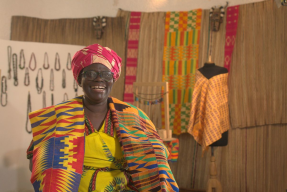
I never thought I would move to Tanzania to learn about Bengali culture, but then again I never thought I’d eat octopus for dinner so sometimes one must adjust expectations. How have I happened to find myself sitting in an office shared by one Bengali woman, one Tanzanian woman, and me? Such is life at BRAC Tanzania’s country office.
BRAC Tanzania is one of the international legs of the Bengali NGO BRAC (formerly Bangladesh Rural Advancement Committee). Started in 1972, BRAC has grown to be the largest NGO in the world and employs over 100,000 people in Bangladesh alone. They have programs beyond microfinance like agriculture, health, education, and economic development. Recently, BRAC has started to spread to other parts of the world, like Tanzania, Uganda, and Sierra Leone. BRAC Tanzania began in 2006 and is growing rapidly. The country office is in Dar Es Salaam, where I am based, but they currently have more than 55 microfinance branches throughout the country and expect to expand to 80 branches by the end of the year. The way that BRAC maintains standardization is to bring Bengali staff to its new country offices to implement BRAC’s practices and policies, which is how I have found myself sharing an office with such an international group.
I had my first day on the job just over a week ago and my first impression was that either there had to be some significant communication difficulties or I was surrounded by some seriously language-adept people. A Bengali walked in the room, said hello to me, and then started speaking to his Bengali colleague in Bangla. A few minutes later, a Tanzanian came into the room, said hello to me, and started quickly discussing something in Swahili with his Tanzanian colleague. The language where the three cultures are intended to meet is English, which would be great for me in that I’m fluent—but unfortunately that’s not quite how it seems to work. Occasional words are exchanged from Bengali to Tanzanian and vice versa, but each culture largely sticks to itself due to ease of communication.
The language barrier is indicative of a wider cultural divide between the Tanzanians and the Bengalis in the office. The Bengali staff is in Tanzania for the sole purpose of establishing a strong organization in this country. They moved here on a temporary basis from Bangladesh and left their families behind to work to create a solid foundation for the organization here. The Bengali staff lives upstairs in the same building as the office—and given the close proximity of work and home, it seems they do little besides work and sleep. The office is located off the main street and surrounded by high fences and shrubbery so it feels something like a compound secluded from the dust, noise, and daladalas (the local minibuses) of the rest of the city. They work, eat, and sleep all within the compound. Instead of taking the weekend to explore the city, they work. The whole staff is expected to be in on Saturdays, but the Tanzanians (and I) are given Sundays off. When I got in to work Monday morning I asked a few Bengali coworkers if they got to rest the previous day and all said no, they had been working all day.
For the Tanzanians, on the other hand, this is a job. That is not to say that they don’t care about it or are not dedicated—but this is where they live and their lives extend far beyond the walls of the office to where their families, friends, and homes are. They work during normal business hours (usually 8:30am to 4:00pm) but then they go home to attend to the other aspects of their lives. If I leave the office at 5 or 6, the Bengali staff is still working, without any sign of letting up for the evening. The priority among Tanzanians seems to be family first—I have seen evidence repeatedly of the strength of the family unit. I spent a few days in one of the rural branches outside of Dar Es Salaam last week and one day, one of the employees came in to work several hours late. Explaining where she had been, she said she had to help her sisters with a problem that had arisen. This 23-year-old woman had previously informed me that their parents are dead and as such, she is the maternal influence in her sisters’ lives. That she would miss a half day of work to help them with a problematic situation was not surprising to her Tanzanian supervisor. The importance of family was reinforced the next day, “salary day” (a.k.a. pay day), when the employee’s sisters came to the office so that their big sister could give them some money. On salary day, the whole family benefits—the employee does not keep it for herself.
So, what is the effect of all of these cultural differences on BRAC’s microfinance operation in Tanzania? I hate to disappoint you, but I think it’s too soon to say. Preliminary observations make me wonder how the organization will change or shift as the Bengali’s gradually phase out (which they intend to do as they eventually put the control of the country operation in the hands of Tanzanians). I want to know if the work is affected by the fact that the people at the top are somewhat disconnected from the country itself by virtue of the presence of a “compound”. I want to know if an operation and its standards that originated in Asia can translate smoothly into African culture. Finally, I want to know if a Bengali, a Tanzanian, and an American can meet somewhere in the middle to find our common ground.
Want to see more? Click here to see BRAC’s currently fundraising loans.
/>PREVIOUS ARTICLE
AMEX Members Project Update - Nominate Kiva Today! →NEXT ARTICLE
Wheelchair donated to a Kiva Mozambican client by KivaFriends!!! →













